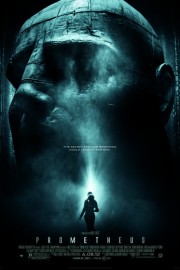Prometheus
For the first time in 30 years, Ridley Scott has ventured into the world of science fiction with “Prometheus,” and it’s the most exciting, morally intriguing film he’s made in a decade. Unfortunately, Scott decided to add a teaser at the end of the film to remind us, definitively, that yes, this is a prequel to his 1979 classic, “Alien” (as if we didn’t realize that already). Of course, since that’s the biggest complaint I have about the film, I supposed it could be worse. It could be “Alien vs. Predator” all over again.
Even more so than after I rewatched “Alien” for my “A Movie a Week” review last week, I found Ridley Scott channeling “2001: A Space Odyssey,” even as he and writers Jon Spaihts and Damon Lindelof lay down elements of the world Scott created with “Alien.” For much of the film’s 2-hour running time, “Prometheus” engages us with a tone that is more cerebral than visceral, more interested in ideas than thrills. This is Scott at his most intriguing as a director, as he finds a way to match remarkable visuals with large-canvas storytelling. And while I didn’t watch the film in its native 3D (we didn’t make it in time for that show), I can say that Scott hasn’t offered up a vision this thrilling since his last sci-fi landmark, “Blade Runner.”
The film begins with two points of discovery. The first is on a planet that looks very much like our own, except those doing the discovering are definitely not human, and the realization marks an ending. The second one is in Scotland in the year 2089, as two archeologists (Elizabeth Shaw (Noomi Rapace) and Charlie Holloway (Logan Marshall-Green)) discover a long-lost cave drawing, which points to early man, looking at the stars. The drawings bear similarities to others that have been found throughout history, implying that each of these cultures have “met their makers,” as it were. Four years later, Shaw and Holloway are on an exploratory ship, the Prometheus, heading to a galaxy that matches the drawings. The ship is run by David (Michael Fassbender), an android that is being taught to interact with…whatever is found. When they land, they begin searching the pyramids on the surface, and what they find is interesting, bringing up more questions than answers.
“Prometheus,” famously, began life as a straight-forward “Alien” prequel (Scott’s chance to finally return to the world he created), but the movie developed into something bolder. Now, the film– though still containing connective links to the “Alien” franchise –focuses more on man’s eternal search for its origins. It’s true that, once we begin to really think about the narrative, elements begin to unravel, but Scott is able to thrust the story forward in a way that, however convoluted, still holds our attention. (Well, MY attention, at least. The movie has been getting mixed reviews from audiences.) Of course, it helps that Scott has a cast of strong actors bringing these characters to life, whether they’re emotionally-driven like Rapace’s Shaw (whose father also asked the big questions about life); financially drawn to the job like Idris Elba’s captain; secretive like Charlize Theron’s Meredith Vickers; or intellectually fascinated by human nature like Fassbender’s David. Shaw even gets into the action like Sigourney Weaver’s Ripley from the original “Alien” movies, even though there’s some suspension of disbelief required when she’s forced into action after, well, I wouldn’t want to spoil any of the story.
The images, however, I could talk all day about. I won’t, but after 35 years (when he made his first feature, “The Duelists”), Scott remains one of the greatest visual filmmakers in history. The interiors of the pyramid the crew explores are striking in their scope: What built this? Why was it built? And why does a giant head resemble that of humans? And what happened to those who built it? The black goo David discovers may contain some answers, or it could lead to man’s own undoing. And when we do see other lifeforms, whether it’s the origin race of the opening, or the murderous aliens who begin picking off the crew, we are both impressed at their originality, not to mention their hints of what we’ve already seen of this universe. Of course, I wouldn’t expect anything less from the director of so many movies that remain in our memories, long after they’ve finished.
The new sci-fi epic from Ridley Scott has been released recently in cinemas. If you would like to see more great Sci-fi movies or programmes then why not visit www.lovefilm.com.










